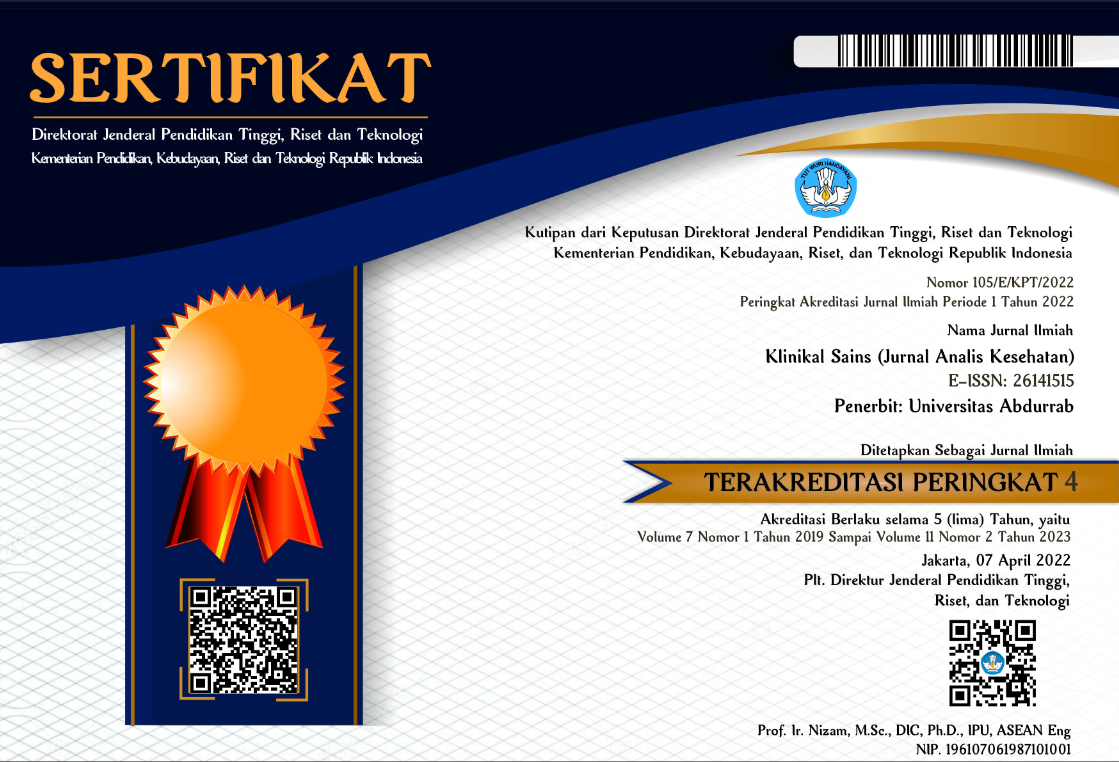POTENSI FILTRAT UMBI TALAS (Colocasia esculenta (L.) Schott) SEBAGAI ANTIKOAGULAN
Abstract
A Clinical laboratory is a health laboratory that carries out clinical specimen examination services with the type of blood test material. Blood that is used as an examination material sometimes requires additional substances that can inhibit blood clotting such as anticoagulants. Natural ingredients that are thought to have anticoagulant content are taro tuber filtrate (Colocasia esculenta (L.) Schott). This study aimed to determine the potential of taro tuber filtrate (Colocasia esculenta (L.) Schott) as an alternative anticoagulant. The method used in testing anticoagulant activity is Clotting Time in Vitro. Taro tubers are grated and filtered to obtain filtrate from taro tubers. Taro tuber filtrate test samples are divided into 5 concentrations of 10%, 30%, 50%, 70%, and 90%. Each concentration was carried out 4 times with each treatment given a blood sample of 1 mL. The results of the phytochemical screening test of taro tuber filtrate contain secondary metabolite compounds of flavonoids, alkaloids, and saponins that have anticoagulant activity. Based on the results of clotting time testing that 1 mL of blood mixed with 10% taro tuber filtrate clotted after the 15th hour, while concentrations of 30%, 50%, 70%, and 90% did not occur blood clots after observation for 6 days. Based on the results of research that has been done, it can be concluded that taro tuber filtrate (Colocasia esculenta (L.) Schott) has the potential as an alternative anticoagulant
Copyright (c) 2023 Klinikal Sains : Jurnal Analis Kesehatan

This work is licensed under a Creative Commons Attribution-NonCommercial-ShareAlike 4.0 International License.
1. Copyright of all journal manuscripts is held by the Klinikal Sains : Jurnal Analis Kesehatan
2. Formal legal provisions to access digital articles of electronic journal are subject to the provision of the Creative Commons Attribution-ShareAlike license (CC BY-NC-SA), which means that Klinikal Sains : Jurnal Analis Kesehatan is rightful to keep, transfer media/format, manage in the form of databases, maintain, and publish articles.
3. Published manuscripts both printed and electronic are open access for educational, research, and library purposes. Additionally, the editorial board is not responsible for any violations of copyright law.
licensed under a Creative Commons Attribution-ShareAlike 4.0 International License.
 pdf
pdf
 Abstract views: 114
Abstract views: 114
 downloads: 116
downloads: 116

 :
:






